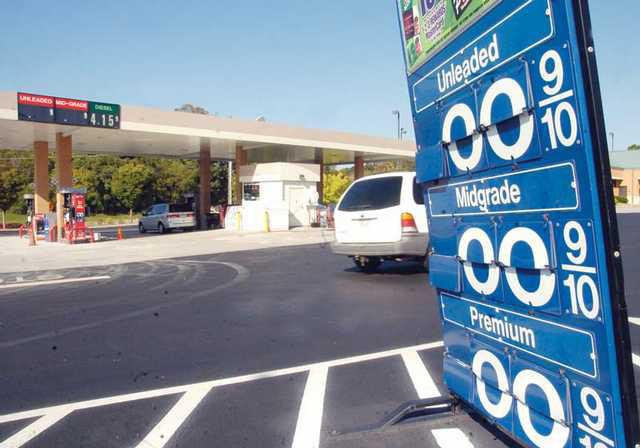0923GASaud
Listen to Mike Thornbrugh of QuikTrip talk about how the company has changed its approach since panic at the pumps made area fuel shortages more severe.
After receiving a morning shipment of gasoline, a cashier at the QuikTrip on E.E. Butler Parkway said there was no way the convenience store would run short on fuel Monday. But by Monday evening, a Mansfield Oil tanker refilled the station’s underground tanks, and motorists covered nearly every inch of the pavement, taking advantage of the fact that QuikTrip was one of only two stations in a seven-mile stretch from Interstate 985 to the Kroger on Thompson Bridge that had any unleaded fuel left. Both officials from local gas stations and AAA say they expect the area’s fuel supply to improve in the next few days, and say panicking consumers have helped cause local fuel shortages. With multiple oil refineries along the Gulf Coast recovering from Hurricanes Gustav and Ike, supply is most definitely an issue, said Mike Thornbrugh, a spokesman for QuikTrip. But what the companies have experienced — long lines of motorists filling up nearly every legal receptacle in their possession — "devastates the logistics" of keeping fuel at stations while suppliers rebound from the storm, Thornbrugh said. Only about eight of the 14 large Houston refineries affected by Hurricane Ike have even partially recovered from the effects of the storm, thus limiting the Southeast’s fuel supply, said Gregg Laskoski, managing director of public relations for AAA. "The Department of Energy said it typically takes between six and 14 days for a refinery to return to full operations once it shuts down," Laskoski said. "We’re well within that timeline right now." The issue impacting the fuel supply coming from Houston is not really so much damage to the refineries as it is a lack of electricity, Laskoski said. "With Ike, it seems that (shortages are) more extensive (than with Gustav) even though the refineries were not necessarily damaged. The fact that a number of them lost power ... has contributed to the delays that we’re still seeing," Laskoski said. On Monday afternoon, however, utility companies were able to restore power to at least one of the major facilities, Laskoski said. Of the Southeast states suffering shortages in fuel supply following Hurricane Ike, Georgia seems to be suffering the most, Laskoski said. "We’re seeing it in Tennessee and some markets in Florida as well, but I would say that it’s much more prevalent in Georgia," Laskoski said. The Environmental Protection Agency’s Clean Air Act requirements for fuel distributed in the metropolitan Atlanta area may be part of the reason local gas stations are suffering while other areas not limited by the EPA’s requirements seem to have plenty of fuel, Laskoski said. On Sept. 11, the EPA, anticipating Ike, waived the more stringent requirements for fuel distributed in the Atlanta area and areas of eight other Southeast states, allowing for the sale of "winter fuel" to cushion fuel supply while gasoline production was limited in Houston. That waiver expired on Sept. 15, however, and has not been reissued, Laskoski said. "That’s one of the reasons why it’s difficult to provide sufficient supply, because ... even if there were neighboring states that had suppliers that could offer gasoline into the Atlanta market, it wouldn’t satisfy the (environmental) conditions," Laskoski said. But Laskoski said he expected the supply situation to improve over the next few days. In the mean time, panic at area pumps has caused local distributors to take action. On Monday afternoon, nearly 20 of QuikTrip’s 111 Georgia stores were out of fuel, Thornbrugh said. Foreseeing future outages, the corporation’s executives decided to revert to a plan they used in the immediate aftermath of Ike to keep a full fuel supply at half of the company’s stores 24 hours a day. "... There’s going to be some spot outages, and it’s going to get better, but it’s going to take some time to get caught up," Thornbrugh said. Before Ike, Thornbrugh said the company knew that at least 20 percent of its suppliers’ refining capacity would be compromised for about one month. At that point, QuikTrip executives decided to keep at least 25 percent of the company’s stores stocked with fuel at all times for a few days after the hurricane. "And that worked," Thornbrugh said. "But I don’t think anybody expected this run. We didn’t. So we’re looking at it again. "We keep learning lessons from day to day on this thing." Now, QuikTrip executives are not sure when to expect an uninterrupted supply again, and estimates on when to expect the refineries to resume regular production keep changing, Thornbrugh said. "It’s really an unpleasant situation that nobody likes," Thornbrugh said. "It will correct itself, but it’s not going to happen overnight." Gov. Sonny Perdue signed an executive order Sept. 12 activating Georgia’s price-gouging statute in an effort to thwart unlawful increases in gas prices and other products. Unless the executive order declaring a state of emergency is rescinded or extended, it will last for 30 days. By Monday morning, the Governor’s Office of Consumer Affairs had received 1,000 complaints of price gouging from across the state, spokesman Shawn Conroy said. Already, the office has issued subpoenas to 15 convenience stores they believe have increased gas prices unlawfully. That does not mean there will not be more as investigators as the Governor’s Office of Consumer Affairs sort through the complaints, Conroy said. "For this all to play out as far as investigations and settlements, it takes a few weeks for it to work out," Conroy said. After Hurricanes Katrina and Rita, the office negotiated between 70 and 80 settlements with various gas stations across the state, Conroy said. "Only time will tell if that’s going to be the scope of this situation," Conroy said.

